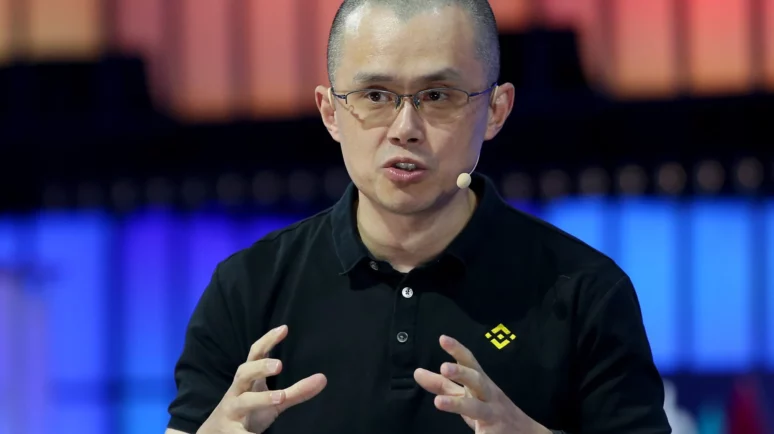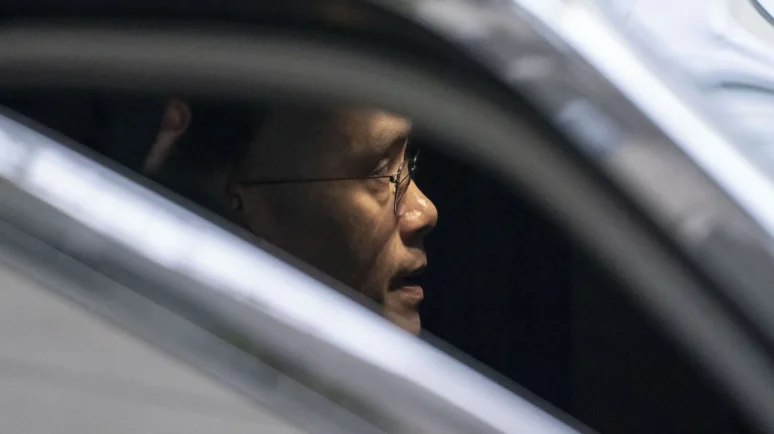Who is CZ? Binance Founder Changpeng Zhao Went From an Immigrant to Canada to the World’s Richest Jailbird

Who, and where, is Changpeng "CZ" Zhao? | Credit: Shutterstock
Key Takeaways
- Chinese-born Canadian citizen Changpeng “CZ” Zhao is the founder and CEO of the Binance crypto exchange.
- Zhao is one of Canada’s richest men and one of the biggest players in the cryptosphere.
- CZ received a sentence to four months after he pleaded guilty to money laundering charges.
Binance is the world’s largest cryptocurrency exchange. However, the organization is in turmoil as it recovers from a US Department of Justice (DOJ) investigation where it was forced to admit wrongdoing. Binance will now pay $4.3bn in penalties and forfeitures, and Changpeng Zhao (or “CZ”) will pay $50m personally. Zhao has already pleaded guilty to money laundering charges and resigned.
Zhao has just received a four-months sentence, a startling fall for the once-king of crypto.
CZ’s Early Years
Changpeng Zhao was born in the Jiangsu province of China on 5 February 1977. Zhao’s father, Shengkai. a university lecturer, was accused of being a “pro-bourgeoise intellectual” by the country’s Communist authorities. He was sent into exile in a rural area of the country not long after Zhao was born. In 1984, Shengkai left China and moved to Vancouver, Canada, where he started work on a PhD at the University of British Columbia. Five years later, following the Chinese government’s crackdowns following the protests in Beijing’s Tiananmen Square, Zhao and his family joined his father.
It was then that Zhao , by now 12, drank fresh milk, a rare delicacy in his homeland, for the first time.
Zhao studied hard at school where, he claimed , he learned “humble values” from Taiwanese students. He held down some part-time jobs throughout his teenage years, serving as a volleyball referee, working at McDonald’s, and helping out at a Chevron petrol station. It was around this time that he earned the nickname CZ. After finishing high school in 1995, he moved across Canada to Montreal, Quebec, where he studied computer science at McGill University, having originally been a biology student. His interest in computing started when his father bought a 286 DOS computer for $7,000.
In 2000, Zhao dropped out of University after an internship on the Tokyo Stock Exchange turned into a full-time job. He entered the world of finance and technology, developing software for Bloomberg. In 2005, he moved back to China, settling in Shanghai and setting up the Fusion Systems IT and business consultancy firm.
CZ and Crypto
Having moved across the world – twice – Zhao took a relatively global view of affairs. He suffested in one interview that international borders were “ just conceptual things that some people made up” and, when cryptocurrency came into being when Bitcoin was launched in the late 2000s, it pretty much made sense for him to get involved. Taking part in a late-night poker game with Chinese Bitcoin (BTC) enthusiast Bobby Lee and venture capitalist Ron Cao, he found out about cryptocurrency and, soon after, sold his apartment and invested $1 million in Bitcoin.
CZ Founds Binance
With Shanghai becoming a center for the burgeoning crypto industry, Zhao invested in blockchain finance. He also carried out work for blockchain companies, including a spell at Chinese crypto exchange OKCoin. In 2017, he founded Binance. The idea was to, as an early company slogan, stated: “Exchange the world”. With a name that was a portmanteau of binary and finance, it aimed to be at the cutting edge. The idea was to create a site where it was easy, convenient, and comparatively inexpensive to buy, sell, and trade crypto.
Binance took off in a massive way, with its launch coming not too long before the world of crypto entered a bubble, with prices skyrocketing in late 2017 and into early 2018. Although the bubble burst, leading to a so-called crypto winter, Zhao had already been able to bolster both his company’s and his own reputations, making the front page of the prestigious Forbes magazine.
Binance First Brush With the Authorities
As crypto expanded, so did the sights of regulators across the globe. China, which had initially been a good place for crypto companies, started to crack down. Binance also opened offices in Japan, Singapore and Malta but, when the regulations got too tight, they exited those markets. By early 2019, Binance was claiming to have no headquarters at all. With a variety of subsidiaries across the world, it looked as if the company was, perhaps appropriately, decentralized, at least in its structure if not in its overall operations.
With a variety of different subsidiaries and offices around the world, there was always going to be more and more interest from regulators. While Binance blossomed during the crypto bloom of early 2021, there was bad news from the UK, where the country’s Financial Conduct Authority (FCA) barred Binance from operating in May that year.
In 2022, crypto went through a bad period, with a series of market crashes. One of them may have, inadvertently, been partially caused by Zhao himself. Shortly before the FTX exchange collapsed in November, it looked as if Binance would take over Sam Bankman-Fried’s stricken business. However, it changed its mind, condemning FTX to bankruptcy. FTX’s founder, Sam Bankman-Fried, would face trial for fraud charges.
Binance Gets Sued by the SEC
In 2023, though, things looked like they were starting to fall apart for Zhao and his exchange. American regulators started to get more and more interested in crypto following the collapse of FTX and Binance, which had been under investigation by the US Department of Justice over money laundering claims since 2018, was perhaps the logical target. In March this year, the US Commodities Futures Trading Commission (CFTC) charged Binance, Zhao, and the company’s former Chief Compliance Officer Samuel Lim with breaching derivatives rules and willfully evading American law.
In a court filing , the CFTC said: “Binance, under Zhao’s direction and control and with Lim’s willful and substantial assistance, has solicited and accepted orders, accepted property to margin, and operated a facility for the trading of futures, options, swaps, and leveraged retail commodity transactions involving digital assets that are commodities including Bitcoin (BTC), Ether (ETH), and Litecoin (LTC) for persons in the United States.”
Things got worse for Zhao and Binance in June, when the SEC sued Binance on 13 charges, including claiming that it was trading in unregistered securities, as well as failing to prevent people in the US from accessing Binance and had misled investors.
Binance was quick to refute the watchdog’s claims, saying they intended to defend themselves “vigorously”. Zhao’s response, however, was a bit more confusing. On 7 June, the SEC filed papers calling for “alternative service” in the case, saying that they were not able to track Zhao down to serve him his court summons. While the man they call CZ was active on Twitter, no one was entirely sure where in the world he actually wass.
Binance did not respond to a request for comment.
CZ Steps Down, Binance Pays $4bn
However, the legal drama would only get worse for Zhao. After months of speculation about an ongoing Department of Justice investigation, the rumors were confirmed in a November 21 press conference with US Attorney Merrick Garland. The DOJ announced it had secured felony guilty pleas from Zhao and Binance for willfully violating anti-money laundering laws.
The Justice Department revealed Binance agreed to pay $4.3 billion in fines and forfeiture of profits. This marked of the largest penalties ever levied against a corporate defendant. CZ pled guilty in person to failing to register Binance as a money-transmitting business and implement an effective anti-money laundering program. Zhao stepped down immediately, ending his reign as the king of crypto exchanges.
“Binance prioritized its profits over the safety of the American people,” declared Attorney General Merrick Garland. He slammed the company for processing nearly $900 million in illegal transactions between US and Iranian users and millions more involving sanctioned regions in Ukraine and Russia.
Garland disclosed internal communications showing Binance executives were aware they were breaking US law but proceeded anyway. “Better to ask for forgiveness than permission,” wrote CZ in one chat. CZ himself credits part of Binance’s success to this rule-breaking. By portraying a facade of blocking US users while secretly catering to high-volume ones, Binance was able to leapfrog the competition.
Garland said: “Using new technology to break the law does not make you a disruptor. It makes you a criminal.
“This Justice Department has no tolerance for crimes that threaten our economic institutions.”
Sentenced To Four Months
How Did CZ Get So Rich?
Changpeng Zhao is, as of May 8, 2024, worth $33 billion, according to Forbes. He has made this money partially through crypto trading but mainly as the CEO and founder of Binance, the world’s largest cryptocurrency exchange. Keep in mind that, with his crypto holding, Zhao may well have a lot more money than he is listed as having.
Is CZ the Richest Person in the World?
Although, by any measurement, Changpeng Zhao is spectacularly wealthy, he is a long way off from being the world’s richest person. Forbes says he is the 50th richest person, with a net worth of $33 billion. For what it is worth, Forbes said the richest person in the world was luxury goods magnate Bernard Arnault.
What Percentage of Binance Does CZ Own?
It is not entirely clear how much of Binance Changpeng Zhao owns, but reports suggest that he owns as much as 90% of the company.
Where is CZ Based?
This is a question that we don’t really know the answer to. According to reports from Fortune, he has homes in Paris, France and Dubai, United Arab Emirates.
However, as of May 8 2024, he is currently in an American prison.
Despite his marital status, Zhao has cultivated a close “life partner” relationship with his business ally and fellow Binance co-founder, He Yi, since their meeting in 2014.
Why Did the SEC Sue Binance?
The United States Securities and Exchange Commission has sued Binance over 13 charges. These include selling unregistered securities, misleading investors, and failing to prevent people in the United States from accessing its services. CZ has received a four-month sentence after he pleaded guilty to some charges.


